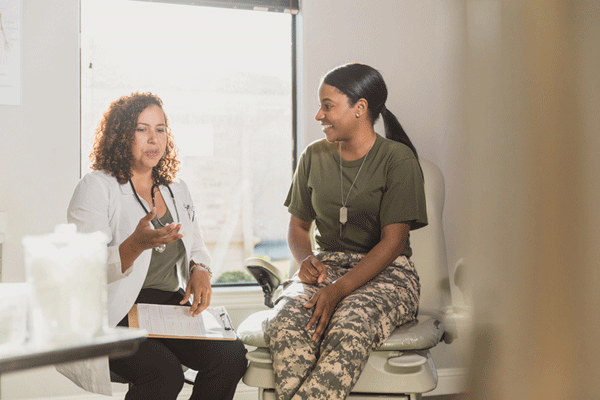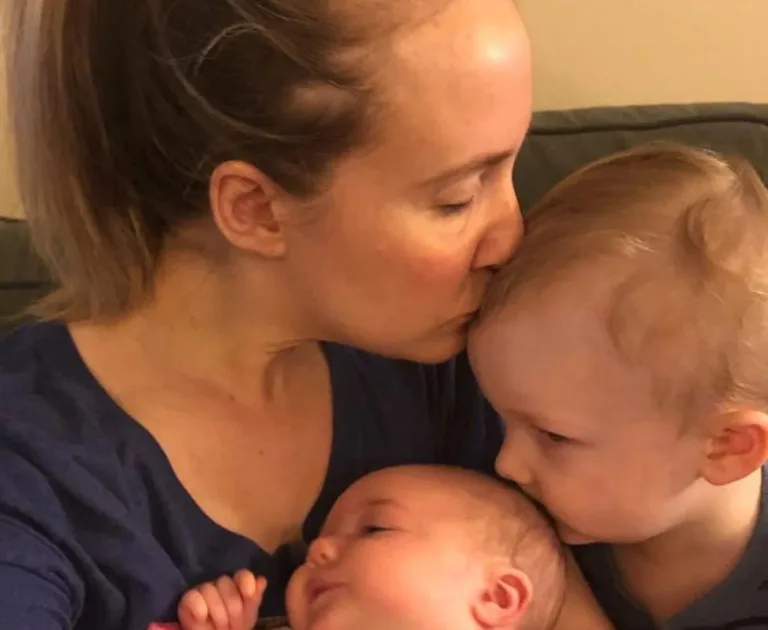As told to Erica Rimlinger
“I can’t believe they sent another one!”
An Army crew member greeted me when I arrived at my unit in Germany as an Apache mechanic crew chief. “Another what?,” I wondered. I soon learned he meant a woman. The woman I’d been sent to replace had left the base in a hurry. I’d understand why soon enough.
I was a quiet, idealistic 19-year-old who joined the Army to get to college. Physically and mentally tough from my south Philly childhood, I carried my 60-pound toolbox without any problem, willfully ignoring insulting comments from co-workers who sneered and asked if I needed help. I just wanted to blend in with the men and do my job.
Within a week I was called into the sergeant major’s office. “Private, do you want to stay in my unit?” he asked. Stunned, I wondered: Had I done something wrong? “Yes, sergeant major,” I replied. “Then you have to go on birth control,” he stated. I stuttered out a shocked protest, assuring him I had no plans to do … anything. “It doesn’t matter what you’re planning,” he said, gesturing to the male co-workers outside the office.
I didn’t know at the time just how right he was. But my situation was already becoming horrifically clear to me. I learned there was a “prize” among my co-workers for getting me to bed first: a case of beer. My co-workers regularly used the women’s latrine — until I got a lock for it.
I went to the female chaplain and asked if our leaders could force us to go on birth control. I spoke with her in confidence, but she filed a sexual harassment report on my behalf without telling me. The hostility from my male co-workers that simmered just under the surface exploded. I was called a narc, a turncoat and a snitch.
With only my word against his, the investigation cleared the sergeant major of wrongdoing. The chaplain wanted me to appeal and was angry when I didn’t. Why would I appeal? Why would anyone in that work environment — surrounded by posters of naked women, openly resented for having a designated women’s latrine, treated as a targeted conquest — do that to herself?
As my unit prepared to deploy to Bosnia, I began to understand it wasn’t my career at stake: it was my life. Unless my colleagues could bed me, they had no use for me. If I went into combat with these people, I wouldn’t be coming home.
So when the pelvic pain started, I thought, “Oh please no. Not here. Not now.” I frequently went to the medical station, but it took 10 months of pain and pleading to get a referral to a gynecologist for an ultrasound. Before I got the results, I was sent to the field for an exercise.
That’s where I was assaulted by a noncommissioned officer (NCO).
That evening, the Apaches were flying under blackout conditions. The NCO was drunk and ordered me to drive him in a Humvee (with the lights off because of the blackout) on a dark, one-lane tank trail. A few hundred yards outside of the base, he ordered me to stop driving, then assaulted me. I managed to fight him off and get away, leaving him out on the tank trail while driving back to base in a panic with no headlights, unable to see in the dark.
I ran into the latrine to hide, bawling. Just then, the commander walked in. This was a co-ed latrine because there was no women’s latrine in the field. He asked if I was all right. What could I say? I was sitting on the floor of the latrine being asked by the man in charge if I was OK. I was not OK. But I had no agency, no recourse, no hope of ever being believed. Years later, on my last day of service, he told me, “I knew something really bad had happened to you that night. But my hands were tied. You had to come to me.”
After the field exercise, I received my ultrasound results and learned that I had a large mass on my left ovary. I was confused: most of the pain was on my right side. When I expressed concern about my future fertility or preserving my ovary, the surgeon said, “That’s why God gave you two.” But six months later, the surgeon told me I would lose the right ovary as well. During that surgery, the surgeon accidentally nicked a hole in my small bowel, requiring a nasogastric tube.
I was 21 years old and in menopause. I had no confidante, no mentor, nobody to help me process or understand anything I’d experienced. Worst of all, I was still in pain. For two and a half years, I fought to get Army medical care to believe me and help me find the root cause. Finally, I paid out of pocket to see a German doctor, who did a simple ultrasound and found that when my right ovary was removed, the surgeon accidentally left a piece of the ovary in my body.
I finally got a medical discharge from the Army, married and went to college, hoping to put my Army experience behind me as I worked toward my master’s degree in social work. But the leftover piece of ovary was causing blockages in my ureters and kidney regularly.
This is an extremely rare medical complication. Most doctors don’t believe me when I tell them, until I explain the situation — and when it is confirmed in surgical pathology reports.
I had several surgeries to fix the original problem, and each surgery did more damage to my small intestine.
A fistula, or hole, formed between my small intestine and bladder, after one of many surgeries. This surgery was supposed to be a quick one I’d scheduled between two college semesters. Instead, I developed bacterial sepsis, then fungal sepsis, and nearly died. More sections of my small intestines and bladder were taken, along with my uterus.
Many years, and many surgeries later, I can finally walk and lie down again without pain. I have learned to live, not just cope, with my medical issues. Deep abdominal massage therapy has helped break up the scar tissue in my abdomen, and practicing yoga has saved my life emotionally and physically. But I will always carry the scars from my time in the Army.
The Army has created the perfect system to silence women. But the armed forces might not want to underestimate our resilience. Years later, when we are stronger and whole again, we will speak up — maybe only in small numbers at first. But with every story shared and every truth spoken out loud, our voices will grow until we can no longer be ignored.
Have a Real Women, Real Stories of your own you want to share? Let us know.
Our Real Women, Real Stories are the authentic experiences of real-life women. The views, opinions and experiences shared in these stories are not endorsed by HealthyWomen and do not necessarily reflect the official policy or position of HealthyWomen.















